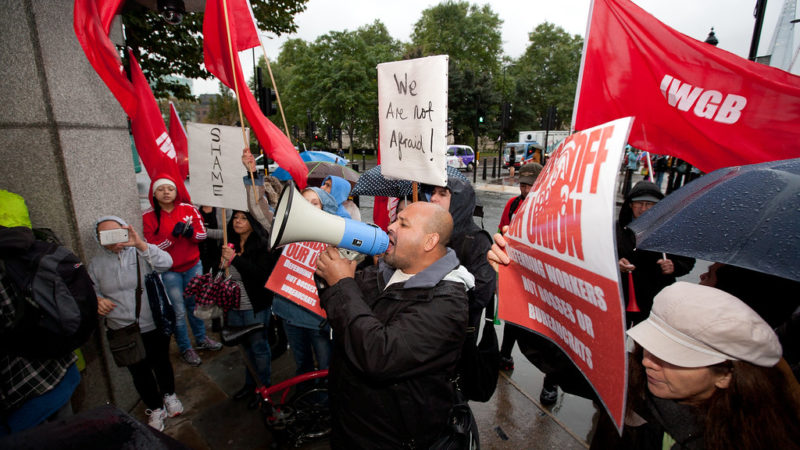The IWGB want proper wage protection and sick pay for millions of self-employed workers, amid the coronavirus crisis.

The Independent Workers Union of Great Britain has smashed its fundraising target to take the government to court over a lack of support for self-employed and freelance workers amid the coronavirus crisis.
The IWGB, which represents thousands of workers in the so-called ‘gig economy’ such as Deliveroo and Uber Eats, is taking legal action against the government over its failure to protect the wages and jobs of millions of workers during the Covid-19 pandemic.
In a letter before action – the first stage of action before a judicial review in the High Court – the union will argue that the current £94.25 per week Statutory Sick Pay (SSP) arrangement discriminates against women, BAME workers and workers in the so-called ‘gig economy’ for whom these payments are not enough to survive or in some cases not even available at all.
SSP is not available to any independent contractors, freelancers and most of those working in the gig economy. There are around five million self-employed workers in the UK.
The union argues, in a legal letter seen by Left Foot Forward, that the 80% wage subsidies offered by the government to businesses to keep people employed discriminates against gig economy workers and other self-employed workers, who are not included in the scheme.
The legal case also argues that the lack of support for self-employed and gig economy workers in the Coronavirus Bill poses a major threat to public health, since many workers are forced to continue working while sick or while they should be self-isolating in order to survive.
A recent survey by Populous for the Royal Society of Arts and Manufacturing found that 55% of those on zero-hour contracts would feel obliged to work, even if they fell ill with coronavirus – due to the need to keep earning income.
The IWGB have raised nearly £20,000 in just three days for its legal crowdfunding appeal – smashing through its initial £8,000 target.
Greg Howard, a Deliveroo rider and Secretary of the IWGB’s Couriers and Logistics branch said:
“While other workers are being offered some assistance during the Covid-19 pandemic, as a ‘gig economy’ worker I am being refused even the most basic protections. While the government expects workers such as myself to provide essential services during this crisis, if I am sick or if the company I work for has to downsize, I’ll be driven into deeper hardship. The law has to change so that it protects all workers.”
The IWGB is the UK’s leading union for precarious workers who often have no formal status of employment. It has previously taken legal action against the UK government, Uber, Addison Lee, Deliveroo, eCourier, City Sprint, The Doctors Laboratory and The University of London, and has become known for winning landmark victories for previously non-unionised low-paid workers.
Linda Arteaga, a cleaner and member of the IWGB’s Cleaners and Facilities branch said:
“I work as a cleaner and I am a widowed single mother. As important as it may be to self-isolate, having to live for half a month on £94.25 per week would make my life impossible. I would have to choose between buying food for my family and following the Government’s health advice to protect the public.”
IWGB General Secretary Dr. Jason Moyer-Lee said: “Many low paid and precarious workers are on the front lines of this crisis distributing food, delivering medical samples, cleaning buildings and looking after children in need, yet they have the least protection. Many who become sick or need to self-isolate will receive little or no sick pay.
“Others who are laid off will not receive wage subsidies from the Government because they are not employees. No one wants to be litigating right now, but we also cannot stand by while our members are exposed to unnecessary risk or driven into destitution.”
Last week the union sent a letter to Prime Minister Boris Johnson demanding that he agree to 12 demands to protect the health, safety, and financial security of low paid precarious workers.
Josiah Mortimer is Editor of Left Foot Forward. Follow him on Twitter.
To reach hundreds of thousands of new readers we need to grow our donor base substantially.
That's why in 2024, we are seeking to generate 150 additional regular donors to support Left Foot Forward's work.
We still need another 117 people to donate to hit the target. You can help. Donate today.



